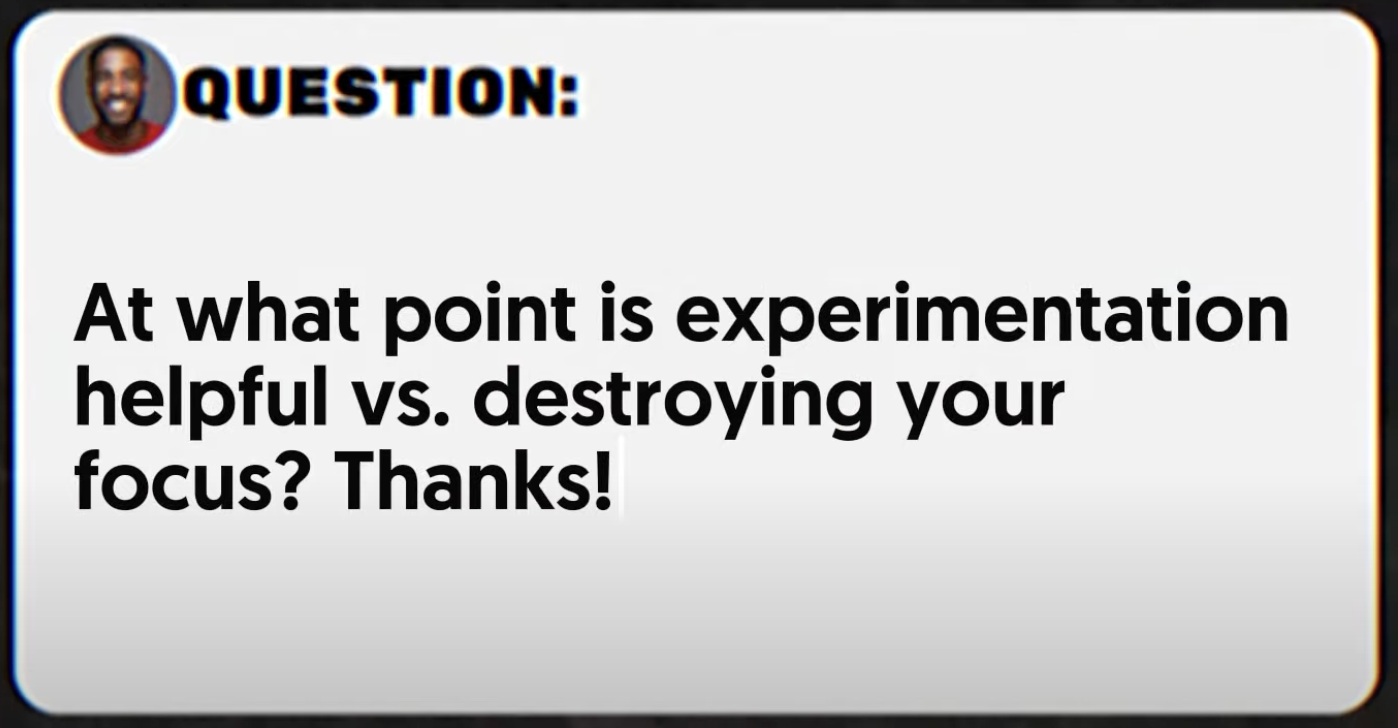The path to business growth is often riddled with decisions that can make or break your venture. One of the most crucial decisions revolves around the age-old debate of focus vs experimentation.
Let’s dive into this topic and explore how you can effectively grow your business by striking the right balance between the two.
Focus vs Experimentation in Business
When it comes to growing a business, understanding the distinction between focus and experimentation is paramount.
Imagine you’re at a crossroads: One path leads to a well-trodden route, while the other offers uncharted territory. The former represents focus — sticking to what you know and doing it well. The latter embodies experimentation — venturing into new areas and trying out different strategies.
A question from Twitter perfectly encapsulates this dilemma. To paraphrase, this follower wrote: I only offer content marketing for B2B SaaS. While I believe SEO is valuable, it might not be the highest ROI marketing activity. Should I experiment with other services, or will that destroy my focus?

Focus on the Business that Drives the Most Revenue
The 80/20 rule, also known as the Pareto Principle, states that 80% of your results come from 20% of your efforts. In the context of business expansion, this means concentrating on the core aspects of your business that drives the most revenue.
So if you find that you’re not getting enough leads in the beginning, then you need to think about your offer. Remember that when it comes to SEO, for example, it could take up to three, six or twelve months to start getting compounding traffic.

SEO is just getting harder and harder.
So before you consider branching out, ensure that your primary service or product is robust and profitable. You may have to start thinking about innovative ideas for company growth that are outside of your normal sphere of ideas.
Where Can You Realistically Get More Organic Reach Right Now?
The ultimate goal of marketing is to achieve organic reach and attract more customers. If SEO is posing challenges, where else can businesses find this reach?
For B2B SaaS companies, the answer might lie beyond search engines. Here are two quick examples of platforms and strategies that offer promising opportunities for B2B SaaS:
LinkedIn: The Professional’s Playground
For B2B SaaS companies, LinkedIn is a goldmine for content sharing and engagement:
- Showcase Thought Leadership: Share articles, whitepapers and case studies that highlight your expertise in the SaaS domain.
- Engage in Groups: LinkedIn groups related to SaaS can be a great place to share insights, answer queries and subtly promote your offerings.
- Webinars and Live Sessions: Use LinkedIn’s live video feature to host webinars or Q&A sessions, providing value to your audience and showcasing your product.
Twitter: Real-time Engagement and Insights
Twitter’s real-time nature makes it perfect for B2B SaaS companies to stay on top of industry trends and engage with potential customers:
- Twitter Chats: Participate in or host Twitter chats related to SaaS topics. It’s a fantastic way to engage with a broader audience and establish authority.
- Polls and Surveys: Use Twitter’s poll feature to gather feedback or understand market needs. It not only provides valuable insights but also boosts engagement.
- Share User Testimonials: Positive feedback from existing users can be shared as tweets, showcasing the value your product brings to its users.
These are just two fairly specific examples, but for all businesses it’s essential to identify where your potential customers are and meet them there.
Remember, it’s not just about being present on these platforms, but about delivering value and building genuine relationships – particularly when you’re just starting out with your business.
Learn more about how to effectively grow your business online.
Why You Should Focus on Your Niche
Diversifying too quickly can be a pitfall. Many service-based businesses make the mistake of offering too many services too soon, or doing too many other things at the same time.
Drawing from personal experience, I can tell you that I ventured into various sectors. I tried to do a SaaS business, an education business and a senior living business:

I think all those ventures would have worked out if I just focused on them individually. They did pretty decently on their own, but because we had split our resources from a monetary standpoint and also a people standpoint, it didn’t really work that well. I wound up giving them all up to focus just on my agency and my podcasts.
The beauty of focus is it allows you to move a lot faster because it liberates you from distractions.
The lesson? Focus on your niche. Specialize in what you do best and excel in that domain before considering expansion. You don’t want to sabotage your company!
When to Know if You Should Focus or Experiment
The balance between focus or experiment isn’t black and white. It operates on a sliding scale.
There might be seasons where you need to focus intently on your core business, especially if it’s thriving. But if you notice a decline, it might be time to slide the scale towards experimentation.
The Power of Focus
When your core business is thriving, it’s a testament to the effectiveness of your strategies and the value of your offerings. During such times, it might be wise to:
- Double down on what works: If a particular product or service is gaining traction, consider allocating more resources to it. This could mean ramping up marketing efforts, improving the product based on feedback or expanding its reach.
- Strengthen customer relationships: Engage with your existing customer base. This is always important, but especially when you’re a new business. Offer loyalty programs, seek feedback and make sure they remain satisfied. A happy customer can be a brand ambassador, bringing in more organic growth.
Embracing Experimentation
If you observe stagnation or a decline in your core business metrics, it’s a signal that the market dynamics might be shifting. This is when experimentation can come into play. You might want to try to:
- Diversify your offerings: Introduce new products or services that align with your brand but cater to a different segment of your audience. For instance, if you’re a software company specializing in CRM solutions, consider developing project management tools.
- Explore new markets: If your current market is saturated or facing challenges, look for untapped markets or regions where your product might find a niche.
- Adopt new marketing strategies: Because marketing strategies, not to mention our digital world, are always evolving, what worked yesterday might not work today. Stay updated with the latest marketing trends and be willing to test new channels or tactics.
Either way, be sure to regularly review your performance metrics to make sure you strike the right balance and continue on a path of growth.
Conclusion
The journey of business growth is a delicate dance between staying true to your core offerings and venturing into new horizons. By understanding when to focus and when to experiment, you can seize growth opportunities and steer your business towards success.
Remember, the key to thriving in the business world is adaptability. Whether you choose to focus or experiment, always keep your eyes on the prize: sustainable growth.
If you’re ready to level up your brand, Single Grain’s marketing experts can help!👇
Repurposed from our Leveling Up podcast.



